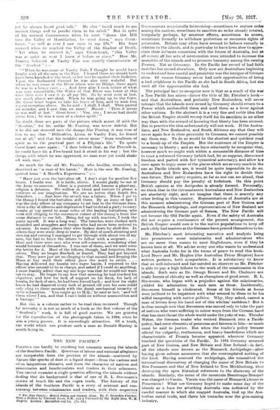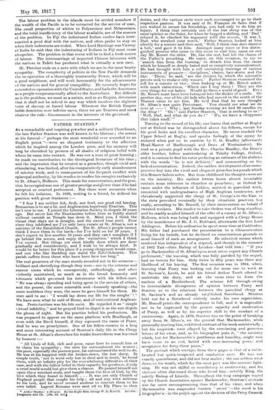THE NEW PACIFIC.* Poranos can hardly be anything but romantic
among the islands of the Southern Pacific. Questions of labour and national allegiance are insepetable from the position of the islands—scattered by Nature like epochs of dust in a liquid desert—from the various and -often languorous climates, and from the character of natives and missionaries and beachcombers and traders in their schooners. You cannot examine a single question affecting the islands without finding that its background is that of one of R. L. Stevenson's stories -of beards life ,aad the copra trade. The history of the islands 0f the southern Pacific is a story of mistrust and con- troversy between missionaries and traders, with their respective
• The Neto Pacific : British 'Policy and German Aims. By C. Brunson' Fletcher. 'With a Preface by Viscount Bryce, 031., and a Foreword by 'the Right lion. W. alts Hughes, LOndon ; Idaendllan and Co, [7s. 04.] Governments occasionally hit ervening--eometimes to restore order among the natives, sometimes to sanction an order already created, irregularly perhaps, by amateur efforts, sometimes to annex, sometimes formally to withdraw protection or renounce rights of possession. Britain may often have seemed -to behave casually irk relation to the islands, and in particular to have been slow to appre- ciate their intimate connexion with the future of Australia, but at all events all her acts of intervention were intended to increase the amenities of the islands and to promote harmony among the owning Powers. Not so Germany. In the Pacific her record of bad faith matches her record elsewhere. Only now are Australians beginning to understand how careful and persistent was the intrigue of German aims. Of course Germany never had such opportunities of being a bad neighbour in the Pacific as she had in South Africa, but she used all the opportunities she had.
The principal fact to recognize now is that as a result of the war a New Pacific has arisen—hence the title of Mr. Fletcher's book- end that Australians, and probably Now Zealanders, will never tolerate that the islands once owned by Germany should return to a Power which mishandled them and used them as a lever against other nations. In the abstract it is a very fine and noble idea that the British Empire should recoup itself for its sacrifices in no other way than with the reward of knowing that liberty has been secured. But in practice the idea unfortunately will not work. If the Austra. liens, and New Zealanders, and South Africans say that they will never again live in close proximity to Germans, we cannot possibly say them nay. To do so would be the shortest and quickest road to a break-up of the Empire. But the existence of the Empire is necessary to liberty ; and so we have reluctantly to recognize that, however much we might wish within a measurable distance of time to trust a reformed Germany (which had, lot us suppose, discovered freedom and parted with her tyrannical autocracy), and allow her once again to enjoy some of the places which are so very much in the sun as Pacific islands are, it would be quite impossible to do so. Australians and New Zealanders have the right to decide their own future. Their safety requires, so far as one can see ahead, that Germany should pay the penalty of forfeiture. On this point British opinion at the Antipodes is already formed. Personally, we think that in the circumstances Australians and New Zealander) are absolutely right, and we imagine that there is scarcely any other feeling in this country. Representatives of Australia are at this moment administering the German part of New Guinea and the Bismarck Archipelago, and representatives of New Zealand are administering the German part of Samoa. The New Pacific: will not become the Old Pacific again. Even if the safety 'of-Australia did not require a continuance of the present arrangement, the British Empire would owe it to the native populations to keep off such vilely bad Masters as the Germans have proved themselves to be.
Mr. Flotcher's most interesting narrative and analysis bring into prominence some missionaries and administrators who are no more than names to most Englishmen, even if they be known here at all. We advise every one who wants to underatand what Australia looks for in the terms of peace to read this book. Lord Bryce and Mr. Hughes (the Australian Prime Minister) have written prefaces, both sympathetic. It is satisfactory to know that so well-informed and fair-minded an observer as Mr. Fletcher is able to pay a high tribute to the work of the missionaries in the islands. Stich mOn as Dr. George Brown and Dr. Chalmers are really heroes of chivalry as well as champions of good sense. R. L. Stevenson, who began with a prejudice against the missionaries, yielded his admiration to such men as these. Incidentally, Stevenson himself is vindicated. Some of his friends at home were inclined to be impatient with what seemed to them to be his wilful tampering with native politics. Why, thoy asked, cannot a man of letters keep his hand out of this witches' cauldron But it is clear enough now that Stevenson was moved only to take the part of natives who were suffering in minor ways from the German hand that has since thrust the whole world under the yoke of war. Theodor Weber, the German trader who enticed Bismarck into a Pacific policy, had some elements of greatness and fairness in him—so much must be said in justice. But when the trader's policy beearne official the vulgarity, restlessness, and heavy-handedness which are characteristic of Prwisia became apparent wherever Germany touched the questions of the _Pacific. In 1884 Germany annexed part of New Guinea, and New Britain and New Ireland—in fact, all the islands' now known as the Bismarck Archipelago—after having given solemn assurances that she contemplated nothing Of the kind. Having annexed the archipelago, she committed the international discourtesy of changing the name of Note Britain to Neu Pommern and that of New Ireland to Neu Mecklenburg, thus destroying the Open historical references to the discovery of the islands. Similarly, the name of the mountain Beantemps-Beaupr6 was changed to Varzin. Varzin was the name of Bismarck's homo in Pomerania ! What use Germany hoped to make some day of the islands as a base for attaeking Australia was indicated by the careful manner in which she mapped Australia, tied up the Aus- tralian metal trade, and threw her tentacles over the gem-mining industry.
The labour problem in the islands must be settled somehow if the wealth of the Pacific is to be extracted for the service of man. The small proportion of whites to Polynesians and Melanesians, and the total insufficiency of the labour available, are of the essence of the problem. In Fiji the indentured Indian coolies have inter- married a good deal with the natives, and often prefer to stay on when their indentures are ended. When Lord Harding° was Viceroy of India he said that the indenturing of Indians in Fiji must cease altogether. The problem in that event will be to find a fresh source of labour. The intermarriage of imported Chinese labourers with the natives in Tahiti has produced what is virtually a new race.
-Mr. Fletcher ends on a note with which wo aro in the most hearty sympathy. The complexity of politics in the Now Pacific demands the co-operation of a thoroughly trustworthy Power, which will be a good neighbour, and will work honourably for the advancement of the natives and for general tranquillity. He earnestly hopes for extended co-operation with the United States, and hails the Americans as a people temperamentally allied to the Australians. But difficult as is tho problem, we must as a nation, and as an Empire, determine that it shall not be solved in any way which involves the slightest taint of slavery or forced labour Wherever the British Empire holds dominion over inferior races, there we aro Trustees and mint observe the rule—Government in the interests of the governed.



























 Previous page
Previous page